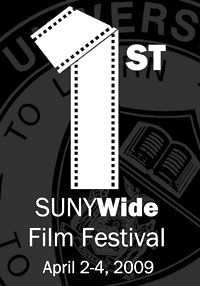|
Competition categories:
ENTRY FORMS Deadline for entries: March 6 ($5 entrance fee; but $10 for entries submitted after March 6 and by March 18).
|
The 81st Academy Awards ceremony may be over now, but SUNY Fredonia will soon make some screen history of its own as hosts of the first-ever SUNYWide Film Festival.
The competition, open to both current students and recent graduates from throughout the SUNY system, will be held April 2-4 in Room 101 of Jewett Hall on the Fredonia campus.
It was created by the Fredonia Media Arts Club to showcase the best student works in film and video. The organization, which currently has more than 20 members, serves as a vehicle for students from all fields of study to share ideas, collaborate on group projects and seek feedback on independent student projects based in the media.
Inviting works by students, recent alumni,
faculty and staff of SUNY
Categories for the competition include: Animation, Documentary, Experimental and Narrative. A separate non-competitive category has been reserved for faculty and staff so their recent creative works may also be seen. Submitted films can range from one to 90 minutes in length.
The entry fee is only $5 for entries postmarked before March 6, and $10 for those postmarked March 7-18. Entry fees at most film festivals typically range between $25 and $100, but the Media Arts Club wanted to keep its charges low and still be able to cover the costs incurred to stage the festival. Entry forms can be found on the festival’s website, and questions can be emailed to swff@fredonia.edu.
Organizers have appropriately chosen “Firsts” as the theme for the inaugural festival. Entries which address that theme will be accorded special status. Screen times each evening of the festival will be determined by the number of submitted films.
Kevin Everson will be guest juror
Award-winning filmmaker Kevin Everson, whose own works have been screened multiple times at the Sundance Film Festival and Rotterdam International Festival, will serve as guest juror. Mr. Everson has dedicated himself to the education of young filmmakers at the University of Virginia, where he has taught since 2001, and his films span all genres.
While at SUNY Fredonia, Mr. Everson will also screen a collection of new short films and conduct a question-and-answer session.
Professor Phillip Hastings' vision is realized
Staging a film festival at SUNY Fredonia was the vision of Phillip Hastings, assistant professor of Visual Arts & New Media, faculty advisor to the Media Arts Club and a former director of the Big Muddy Film Festival, the second oldest student-run film festival now in its fourth decade, while attending graduate school at Southern Illinois University.
“When I pitched the idea to some of my students they all seemed very excited about the possibilities. It helps to have a truly dedicated core of students to pull off this kind of an event,” Mr. Hastings explained.
“I think there is very strong interest and excitement in the inaugural festival,” he continued. “This type of event takes an extreme amount of work and, as a first-time event, we are all very excited but a bit nervous. It is one thing to do an event that involves the SUNY Fredonia student body; it is an entirely different thing to involve students in all of the SUNY system, but we can’t wait to see what other SUNY students and faculty are doing.”
Dallas Greene, festival publicity chair, agrees that the event marks a milestone at SUNY Fredonia.
“I think I’m speaking for everyone when I say it’s an honor to be part of this inaugural event. It’s been a lot of hard work, but just being a part of this has been a great experience. I am excited to see what happens!”
“We are all very excited about the first ever film festival devoted to SUNY students,” added club president Marlon Benloss. Promotion of the festival, which began within the Department of Visual Arts & New Media, has extended throughout the campus as well as to other SUNY schools.
A juried film festival provides experiences that can benefit students in many ways, Hastings explained.
“You can learn much from the process of submitting work. The right festival can also help validate your work. It’s one thing to upload a video on YouTube — and you might even get a lot of hits — but it may not be a venue that carries a lot of weight to someone who might be interested in your work. Students who actually put on the festival will utilize skills in managing people, working with vendors and developing relationships with the local community.”





